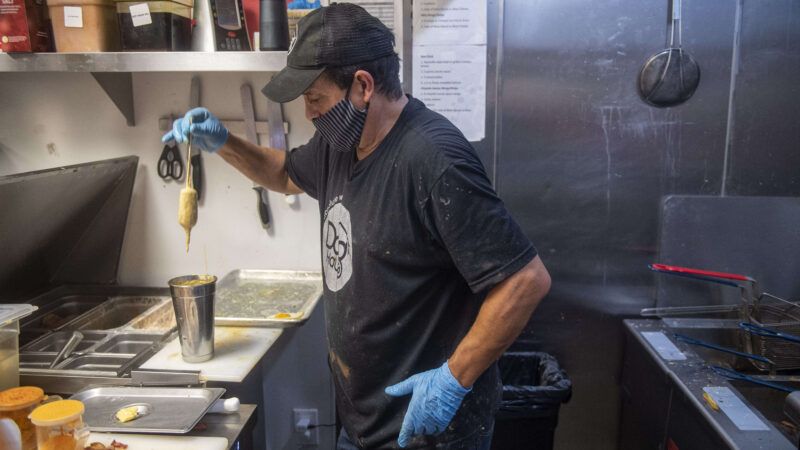'Ghost Kitchens' Spur Overheated Health Concerns From Regulators
Regulators are setting their sights on ghost kitchens and virtual restaurants.

Ordering food from restaurants is an ageless practice. But the explosion of so-called ghost kitchens and similar non-restaurant restaurants has been one of the more notable dining trends during the Covid-19 pandemic.
"Virtual brands, ghost kitchens, delivery-only concepts—whatever you call them—have thrived during COVID-19," Eater reported in 2020. Ghost kitchens, Modern Restaurant Kitchen reported earlier this year, are "delivery-focused kitchens without a storefront or dining area [that] allow operators to utilize commercial kitchens–sometimes in shared spaces with other brands—without the overhead of a full restaurant space and staff."
"At the Peach Cobbler Factory in Charlotte, co-owner Vincent Montgomery prepares decadent southern treats out of a kitchen collective called South End Eats," station WSOC-TV in Charlotte, N.C., reported as part of an "investigation" into ghost kitchens in May. "South End Eats has more than 20 kitchen stalls, each filled with small local businesses exclusively online—no dining rooms."
Virtual restaurants, a close analog, are delivery-only restaurants that operate out of an existing brick-and-mortar restaurant space, typically while that physical restaurant continues to serve as a dine-in restaurant. Some virtual restaurants have partnered with well-known regional and national restaurant chains, including Chili's and Bertucci's.
Regardless of the model, ghost kitchens and virtual restaurants are helping existing and budding brick-and-mortar restaurateurs alike weather the current storm of staffing challenges, supply chain issues, high food, equipment, and rental costs, and various covid-related impacts and restrictions.
Despite their benefits, though, ghost kitchens and virtual restaurants find themselves increasingly in the cross hairs of some food-safety activists and regulators. A piece this week in the Boston Globe—complete with scary headline—highlights some of the concerns public-health regulators in the Bay State have with them.
One criticism the piece lobs is the claim that customers are less able to access restaurant letter grades or other health department assessments "as readily as they could at traditional restaurants, which may be required to display proof of inspection in their storefronts or dining areas."
That's true! But customers who order food by phone or online for delivery from any traditional restaurant—or who live in a city or state that doesn't require the physical posting of such information—won't ever see that same score posted, either. And, to be clear, restaurant inspection grades are an uncertain tool for determining how safe a restaurant's food is to eat. For example, as I noted in a 2019 column, a great investigation by the food website Eater into New York City's restaurant inspection regime concluded the city's "broken" inspection system was forcing city restaurants that weren't engaging in practices that would sicken customers nevertheless "to game the system in order to pass muster with the city's notoriously overzealous health department."
Other health inspector concerns expressed in the WSOC and Globe articles seem to have little to do with food safety. For example, the WSOC article notes that Adam Dietrich, a food-safety consultant quoted in the report, expressed concerns "about whether a restaurant can safely offer various menus."
That argument implies restaurants can't safely serve food from more than one menu. Yet most restaurants have several menus (breakfast, lunch, brunch, dinner, happy hour, children's, Valentine's, Thanksgiving, Christmas, etc.), and sometimes even serve items from each menu at the same time (e.g., breakfast all day)!
Some in Massachusetts are expressing similar concerns.
"If we think a restaurant is not preparing burgers, and there is a food-borne illness involving burgers, and we think, 'It can't possibly come from [that restaurant] because they don't prepare burgers'," that's a problem, Timothy McDonald, health director in Needham, Massachusetts, told the Globe.
Like Dietrich's claims, that deeply flawed argument suggests that for the safety of Needham residents, the city should ban restaurants from running daily specials or updating their menus at all because city inspectors can't do their job properly unless they know what's on every restaurant menu at all times.
Despite the fact many of the concerns about ghost kitchens and virtual restaurants appear vague and overblown, that doesn't mean all criticisms lobbed at the sector are bunk. Some reports have alleged, for example, various food-safety violations and failure to obtain proper permits by Reef Technology, one of the industry's biggest players.
Never mind the fact traditional restaurants sometimes commit food-safety violations and fail to obtain proper permits. The fact the allegations against Reef both came to light and spurred changes doesn't exactly support the arguments of those who imply ghost kitchens and virtual restaurants are somehow operating in the shadows with impunity.
Robert Earl, chief executive of the parent company that owns Bertucci's, told the Globe that what matters for customer safety is how food is prepared and stored, and the sanitation practices of the facility. If inspectors want to know what's happening in ghost kitchens and virtual restaurants, "[a]ll they have to do when they walk through the door … is ask that. No one is hiding it."
Ghost kitchens. Virtual restaurants. The names may be new. The concepts differ slightly from others that have preceded them. They may pose some regulatory challenges. Foods they serve—like foods served by traditional restaurants—may sometimes sicken people. But there's little or no evidence to date that food prepared in ghost kitchens and virtual restaurants is any less safe than other restaurants' food. What's more, at their heart these concepts utilize licensed and inspected food preparation spaces to cook food for delivery to willing customers. So long as that's the case, critics should keep in mind that not every new idea is an invitation to create a slew of new regulations.


Show Comments (123)